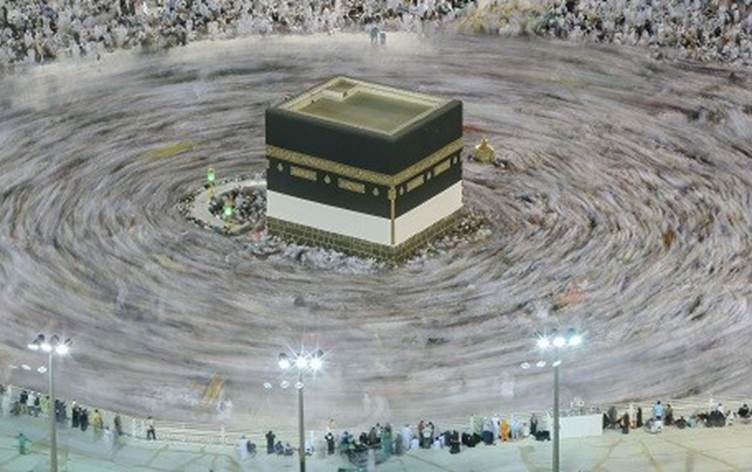ERBIL, Kurdistan Region — With 329 seats in the Iraqi parliament some 30 percent of the legislature is going to Mecca this year because the Islamic pilgrimage coincides parliament's August recess. However, none are Kurdistani MPs, according to a member in Baghdad.
Hajj is the holiest duty in Islam that stipulates, if capable, Muslims perform a pilgrimage to Mecca, located in Saudi Arabia, at least once in their life.
More than 100 MPs are making the journey this season, according to a Saudi Arabian embassy source in Baghdad, who told Rudaw that last year even more went on Hajj with 150 Iraqis making the journey to Mecca.
None of the MPs this year are Kurds, according to Salim Sushkayi, a member of the parliament’s legal committee and a Kurdish mullah.
The reason for the high number could be because the Islamic month of Dhul Hijjah this year occurs during the same time as a parliamentary recess that begins on August 1, according to the deputy speaker of the parliament.
“The reason why this large number of MPs may have gone for Hajj this year might be because the Hajj season falls in the parliamentary recess season as the recess starts on August 1, 2019, and is a month long,” Bashir Haddad, from the KDP, told Rudaw.
Haddad said he has no issue with MPs who have never been before going on Hajj en masse, but that people who have already done so should spend more time in parliament.
“As for those who are there for the second and third time, I believe serving and following up on the issues of the people of Iraq was a higher duty than a second or third Hajj,” said Haddad, who is a mullah by profession and is famous for his Friday sermons in the Kurdistan Region.
Each country gets an allocated number of people who can attend Hajj each year. People who want to go are then chosen at random.
A source from the Saudi Embassy in Baghdad told Rudaw that annually, 2,500 individuals in Iraq are directly given their Hajj seat as part of a “courtesy share”, handed out as a favor by Saudi Arabia to Iraq.
According to the Saudi embassy source, in the “courtesy share”, 2,000 are reserved for federal Iraq, while the remaining 500 are for the Kurdistan Region.
The source further explained that of the 500 seats for the Kurdistan Region, 100 are given to and former Kurdistan Region President and Kurdistan Democratic Party (KDP) President Masoud Barzani.
“He gives all the seats to the families of martyrs,” added the source.
Both President Kurdistan Region Nechirvan Barzani and PM Masrour Barzani also each get 50 seats, according to the source.
Nobody in the Kurdistan Region can go on the pilgrimage using public funds, the KRG Ministry of Endowments and Religious Affairs said.
“Based on the order of the former president of the Kurdistan Region [Masoud Barzani], no individual can undertake their Hajj journey at the expense of the people,” Nabaz Ismael told Rudaw. “Those who would like to go can register their names like normal people, and if their name is chosen from the lottery, then they can go.”



.jpg?mode=crop&quality=70&rand=1&scale=both&w=752&h=472)
.jpg?mode=crop&quality=70&rand=1&scale=both&w=752&h=472)
.jpg?mode=crop&quality=70&rand=1&scale=both&w=752&h=472)
.jpg?mode=crop&quality=70&rand=1&scale=both&w=752&h=472)
.jpg?mode=crop&quality=70&rand=1&scale=both&w=752&h=472)
.jpg?mode=crop&quality=70&rand=1&scale=both&w=752&h=472)
.jpg?mode=crop&quality=70&rand=1&scale=both&w=752&h=472)
.jpg?mode=crop&quality=70&rand=1&scale=both&w=752&h=472)
.jpg?mode=crop&quality=70&rand=1&scale=both&w=752&h=472)
.jpg?mode=crop&quality=70&rand=1&scale=both&w=752&h=472)
.jpg?mode=crop&quality=70&rand=1&scale=both&w=752&h=472)
.jpg?mode=crop&quality=70&rand=1&scale=both&w=752&h=472)
.jpg?mode=crop&quality=70&rand=1&scale=both&w=752&h=472)





Comments
Rudaw moderates all comments submitted on our website. We welcome comments which are relevant to the article and encourage further discussion about the issues that matter to you. We also welcome constructive criticism about Rudaw.
To be approved for publication, however, your comments must meet our community guidelines.
We will not tolerate the following: profanity, threats, personal attacks, vulgarity, abuse (such as sexism, racism, homophobia or xenophobia), or commercial or personal promotion.
Comments that do not meet our guidelines will be rejected. Comments are not edited – they are either approved or rejected.
Post a comment